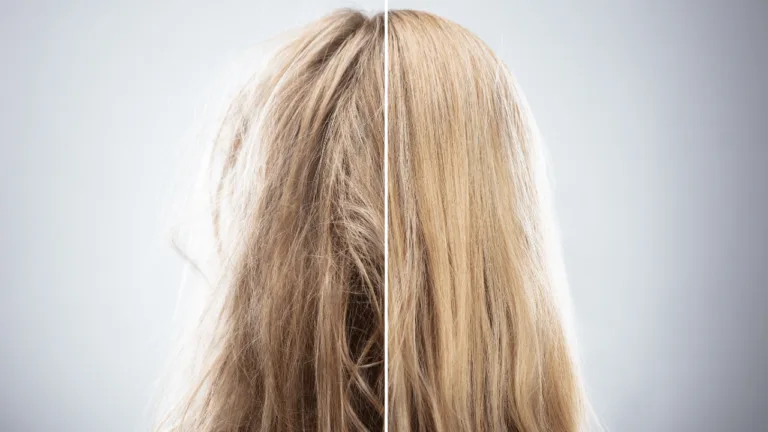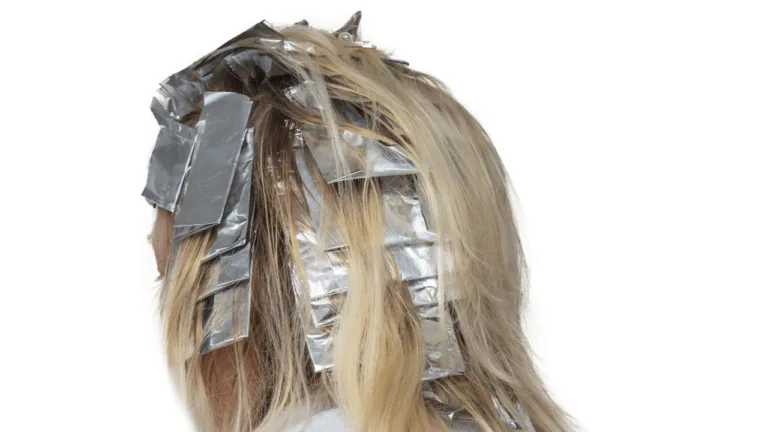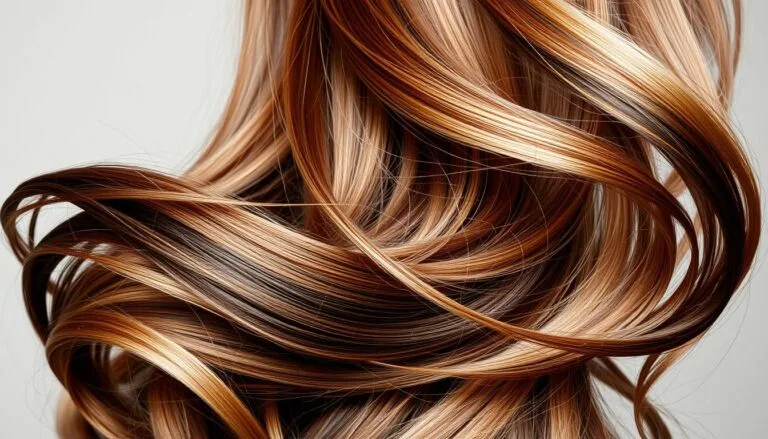Keeping your scalp healthy is key for great hair growth and health. Philip Kingsley, a top name in hair and scalp treatment, showed us how important a healthy scalp is. This guide will share tips on professional hair and scalp care. It will help you get thicker, fuller hair with the right treatments.
Philip Kingsley’s team has over 170 years of experience in hair and scalp care. They say washing your hair daily is best for scalp health. They also suggest using scalp masks for deep cleaning, which is good for oily scalps or those who wash their hair less often.
By treating your scalp with exfoliating, stimulating, and calming treatments, you can get a calm scalp. This calm scalp helps your hair grow healthy.
Key Takeaways:
- Cleansing Hair and Scalp Treatment at least weekly is ideal for maintaining a healthy scalp.
- Using sulfate-free shampoo regularly helps maintain scalp health.
- Excessive wetness on the scalp may lead to bacterial growth and irritation.
- Avoiding oiling the scalp is important, as the Malassezia fungus, associated with dandruff, thrives on oils.
- Scalp products containing oil-free humectants like glycerin, allantoin, and hyaluronic acid can improve the scalp’s barrier function.
Understanding Hair and Scalp Health
A healthy scalp is key for strong, shiny hair. Just like our face skin, our scalp needs care to stay healthy. Experts say regular scalp treatments are vital. They help fight dandruff, dryness, and oiliness.
Importance of Healthy Scalp
The scalp has hair follicles, where hair grows. A healthy scalp is perfect for hair growth. Studies show scalp care boosts hair growth and keeps it longer.
Good bacteria like Propionibacterium acnes also helps a healthy scalp.
Common Hair and Scalp Problems
Many things can make a scalp unhealthy. This leads to problems like:
- Dandruff and flakiness
- Dryness and itching
- Oily scalp and too much sebum
- Inflammation and redness
- Hair loss and thinning
Things like air pollution, dust, and sun can harm the scalp. Stress and hormonal changes can also cause problems. This leads to inflammation, dryness, and flaking.
“Treating your scalp regularly with expertly formulated, scalp care products encourages strong, lustrous hair by creating the optimal healthy scalp environment for hair health.”
The Role of Genetics in Hair Health
Genetics affect hair growth rate, texture, and thickness. They also play a part in scalp conditions. For example, male pattern baldness often comes from the maternal grandfather’s side. Women tend to lose hair more slowly than men.
While we can’t change our genetics, we can keep our scalp healthy. Eating foods rich in omega-3, vitamin A, and zinc helps. This supports a healthy scalp and hair.
Types of Hair and Scalp Treatments
There are many ways to keep your scalp healthy and your hair looking great. You can try over-the-counter solutions, professional treatments, or natural remedies. Each one has its own benefits for different scalp problems. Knowing your options helps you choose the best treatment for you.
Over-the-Counter Solutions
Over-the-counter scalp treatments are easy to find and use. They help with dryness, flakiness, and irritation. Products like Dove Dermacare Scalp Anti-Dandruff Shampoo can reduce itchiness and dandruff flakes.
Professional Treatments
Professional scalp treatments offer a deeper solution. They combine deep cleansing, exfoliation, and nourishment. Formulated by experts, these treatments aim to improve scalp health.
Natural Remedies
Natural remedies can also help your scalp. Coconut oil moisturizes deeply, while gentle exfoliants like glycolic acid remove buildup. Adding scalp massage to your routine boosts circulation and hair health. Mixing natural remedies with targeted treatments can solve many scalp issues.
How to Choose the Right Treatment
Choosing the right hair treatment is key to healthy, beautiful hair. Think about your hair type, scalp conditions, and get advice from professionals. They can help you find the best treatment.
Assessing Your Hair Type
Knowing your hair type is important. Different hair needs different treatments. For example, dry and damaged hair benefits from deep conditioning.
Keratin treatments are great for frizzy hair. Fine or thin hair looks better with volumizing treatments.
Evaluating Scalp Conditions
Your scalp’s health is as important as your hair. If your scalp is sensitive, choose a gentle treatment. Scalp treatments should be done every 4-6 weeks.
This keeps your scalp healthy and prevents problems like dryness or too much oil.
Consulting Professionals
Talking to a professional stylist is the best way to pick a treatment. They consider your hair type, lifestyle, and what you want. At Sunday Salon, our stylists offer many treatments.
- K18 Mask and Mist
- Virtue Labs Restorative Mask
- Virtue Labs Colorkick
- Virtue Labs Flourish Mask
- Goldwell Dualsenses
These treatments solve different hair problems. Our stylists will tell you how often to get your treatment. This keeps your hair healthy and looking great between salon visits.
Ingredients to Look For in Treatments
When looking for the best hair and scalp treatment, focus on the ingredients. Choose products with hydrating agents, anti-inflammatory compounds, and nourishing oils. These help meet your hair and scalp needs.
Hydrating Agents
Hydrating agents keep your hair and scalp moist. Glycerin, a humectant, pulls water to the hair, boosting moisture. Shea butter, jojoba oil, and coconut oil are great for extra hydration.
These natural ingredients are found in clean hair products. They moisturize and strengthen your hair.
Anti-inflammatory Compounds
Anti-inflammatory compounds soothe irritated scalps and reduce redness. Niacinamide, or vitamin B3, can lower sebum production by up to 2%, a study in the Journal of Cosmetic Laser Therapy found. Zinc Pyrithione, a topical antimicrobial, is also good for scalp conditions, a study in the Journal of Drugs in Dermatology shows.
Nourishing Oils
Nourishing oils are key for healthy hair growth and shine. Avocado oil, rich in vitamins A, D, and E, promotes hair growth. Argan oil strengthens hair follicles with its phenols and antioxidants.
Tea tree oil fights fungal and bacterial scalp issues. Peppermint oil boosts hair growth and supports hair health.
“Developing a consistent regimen based on what works well for your hair type is essential for long-term hair health.”
When picking treatment ingredients, avoid sulfates, isopropyl alcohol, formaldehyde, and heavy fragrances. They can harm your hair and scalp. Choose natural, clean ingredients that nourish and protect.
The Benefits of Professional Treatments
Professional hair treatments offer many benefits that go beyond what you can do at home. By letting trained experts work on your hair, you get better results and care that fits your needs.
Stylists have the knowledge and experience to create plans just for you. They can fix frizz, damage, or dullness. Treatments like keratin and deep conditioning can make your hair look and feel amazing.
Cutting-Edge Technologies and Products
Salons use the latest tech and top products for the best results. Their treatments have more active ingredients to really fix hair problems. You can find:
- Hair glossing treatments that make your hair shine
- Scalp treatments that clear out buildup and help hair grow
- Strengthening treatments that fix damage and make hair strong
These new methods and the pros’ skill mean your hair is safe and gets the best care.
Relaxation and Self-Care Benefits
Scalp treatments stimulate blood flow to the scalp, aiding in the delivery of essential nutrients to the hair follicles, promoting healthy hair growth.
Professional hair treatments also feel great. Scalp treatments include massages that relax you and reduce stress. This makes you feel good inside and out, improving your hair and mood.
Choosing professional hair treatments lets you get the most out of your hair. Trust the skills of stylists and the latest tech to change your hair and boost your confidence.
DIY Hair and Scalp Treatments
DIY hair treatments can be a great addition to your hair care routine. They use natural ingredients and recipes to nourish your hair and soothe your scalp. Here are some tips and recipes to start your DIY hair treatment journey.
Recipes for Home Treatments
DIY hair treatments let you tailor them to your hair and scalp needs. Here are a few recipes to try:
- For hair growth: Mix a few drops of lavender oil with a carrier oil like jojoba or castor oil. Massage it into your scalp before shampooing. A 2016 lab study found lavender oil can help hair grow thicker and faster.
- For scalp moisturization: Mix equal parts jojoba oil, castor oil, and sweet almond oil. Apply it to your scalp. These oils are great for moisturizing.
- For clarifying and detoxing: Make a paste with baking soda and apple cider vinegar. Apply it to your scalp and rinse well. This mix is good for removing buildup and balancing scalp pH.
Safety Tips When DIY-ing
DIY hair treatments can be fun and effective, but safety first. Always do a patch test before using new ingredients on your scalp. Be careful of potential allergies or sensitivities. When using essential oils, dilute them with a carrier oil to avoid irritation. Remember, natural ingredients can still cause reactions, so be cautious.
When to Seek Professional Help
If you have ongoing hair or scalp problems, like dandruff, hair loss, or irritation, see a professional. A dermatologist or trichologist can diagnose and recommend treatments. DIY remedies are helpful, but not a replacement for professional advice.
“Regular scalp exfoliation using simple scrubs such as those made from cornmeal or sugar can prevent flakiness and breakouts at the hairline.”
By adding DIY hair treatments to your routine and knowing when to seek professional help, you can have healthier, happier hair and scalp. Happy DIY-ing!
Tips for Maintaining Healthy Hair and Scalp
To keep your Hair and Scalp Treatment healthy, start a daily hair care routine. Use products that match your hair and scalp type. Then, apply a moisturizer to keep your hair hydrated.
Choose styles that protect your hair from damage. Styles like loose braids or buns are good. Avoid too much wetness on your scalp to prevent bacteria growth.
Daily Hair Care Routine
Clean your scalp weekly to keep it healthy. Use oil-free products with humectants like glycerin. This keeps your scalp moist without clogging your hair follicles.
Scalp massage and topical serums can help your hair grow. Sebum, a natural oil, conditions your hair. So, don’t wash your hair too much to keep these oils.
Seasonal Hair Care Adjustments
Change your hair care with the seasons. In summer, protect your hair from UV rays. Use water filters to avoid scalp irritation.
In winter, use a humidifier and deep conditioning to fight dryness. Personalized treatments can help your scalp all year.
Diet and Nutrition for Hair Health
Eat a balanced diet for healthy hair and scalp. Include protein-rich foods, as hair is mostly keratin. Omega-3 fatty acids help with scalp moisture.
Vitamins A, C, D, and E, along with zinc and iron, are important. Drink 4 to 6 cups of water daily. This supports a healthy scalp. By caring for your body and hair, you’ll have healthy, shiny hair.

















[…] on your hair concerns, budget, and look for ingredients that target your specific hair issues. Professional Hair and Scalp Treatment GuideKeeping your scalp healthy is key for great hair growth […]